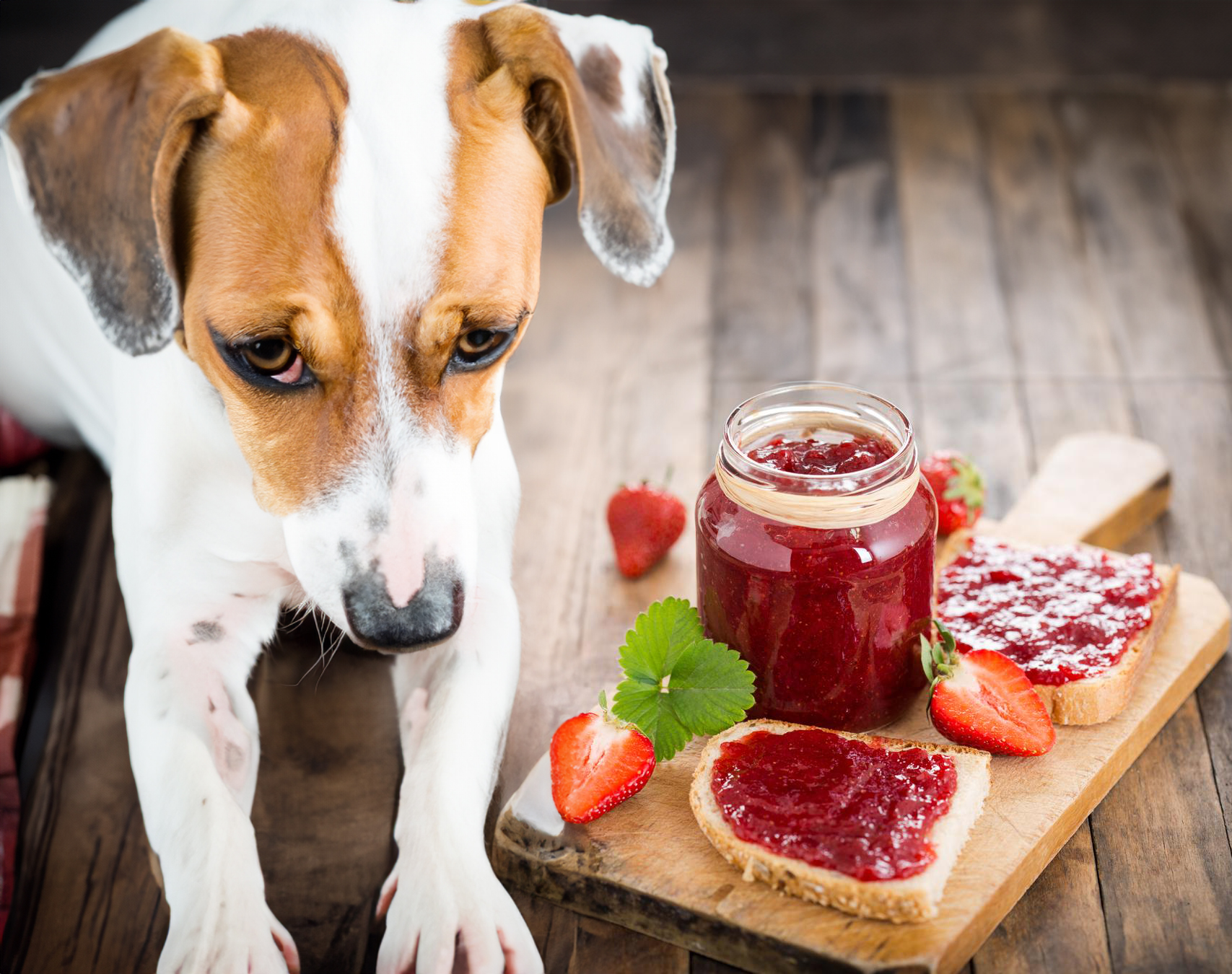Have you ever found yourself enjoying a delightful toast slathered with sweet, sticky jam while your furry friend watches on with longing eyes? As dog owners, we strive to provide our canine companions with the best care possible. But when it comes to sharing our culinary delights, there are certain foods that may be harmful or even toxic for dogs. One of these questionable treats is jam. In this article, we will explore whether dogs can safely indulge in a dollop of jam or if it is better left off their menu altogether. So let’s delve into the world of fruity spreads and uncover what lies beneath them for our four-legged friends.
The Dangers of Jam for Dogs
- High sugar content: Jam is made with a significant amount of sugar, which can lead to obesity and dental issues in dogs. Consuming too much sugar can also cause an upset stomach and diarrhea.
- Potential toxic ingredients: Some types of jam contain artificial sweeteners like xylitol, which is highly toxic to dogs. Xylitol can cause a rapid drop in blood sugar levels and liver failure if ingested by dogs. Always check the ingredient list before feeding your dog any type of jam.
- Choking hazard: Thick textures and chunks of fruit in jam pose a choking risk for dogs, especially those prone to gulping their food without chewing properly.
Before sharing a spoonful of your morning toast’s delicious topping with your furry friend, it’s essential to be aware that jam may not be the safest treat choice for them. Its high sugar content might contribute to weight gain or dental problems over time, potentially leading to further health complications down the road. Additionally, certain jams may contain harmful ingredients like xylitol that are poisonous to dogs when consumed even in small amounts. Finally, due to its thick consistency and potential presence of fruit chunks, jams pose a choking hazard — especially worrisome for those pups who tend to inhale their food rather than savor it slowly.
As caring pet owners intent on ensuring our four-legged companions’ well-being, we must prioritize their safety over our willingness to share every culinary delight with them. While there are other canine-friendly alternatives available that provide equally satisfying tastes while being safe for consumption – such as mashed fruits or specially-made dog treats – avoiding feeding our beloved pets jam will ultimately help them avoid unnecessary risks associated with this particular spreadable delicacy.
Potential Harmful Ingredients in Jam
Some jams contain xylitol, a sweetener that can be toxic to dogs. Xylitol is found in many sugar-free products and can cause a sudden drop in blood sugar levels, leading to seizures or even liver failure in dogs. It’s crucial to check the ingredient list before sharing jam with your furry friend.
Additionally, some jams are made with artificial sweeteners like sorbitol or sucralose. While these ingredients may not be as dangerous as xylitol, they can still cause digestive issues such as diarrhea or upset stomachs for dogs.
Lastly, high amounts of sugar present in certain jams can lead to obesity and dental problems for dogs. Excessive consumption of sugary foods can contribute to weight gain and increase the risk of diabetes and tooth decay over time.
To keep your canine companion safe and healthy, it’s best to avoid giving them jam altogether or only offer small amounts without any harmful ingredients.
Can Dogs Digest Jam?
While dogs can technically digest small amounts of jam, it is not recommended for their overall health.
- Digestion Challenges: A dog’s digestive system is designed to process primarily meat and has a difficult time breaking down the sugars present in jam.
- Potential Upset Stomach: Eating too much jam may lead to gastrointestinal issues such as diarrhea or vomiting.
- Healthier Alternatives: Instead of giving your furry friend jam, opt for natural fruits like berries that are safe and packed with nutrients.
Remember to always consult with your veterinarian before introducing new foods into your dog’s diet, including sweet treats like jam!
Potential Health Risks of Dogs Eating Jam
Jam may be a sweet treat for humans, but it can pose potential health risks to our furry companions. Here are some reasons why you might want to think twice before letting your dog indulge in this sugary spread:
- Sugar overload: Jam is typically loaded with sugar, which dogs do not need in their diet. Consuming excessive amounts of sugar can lead to weight gain, diabetes, and tooth decay for dogs.
- Digestive issues: The high sugar content in jam can cause upset stomachs and digestive problems for dogs. This can result in symptoms such as diarrhea and vomiting, leaving your dog feeling ill and uncomfortable.
- Risk of obesity: Due to its caloric density from added sugars, regularly consuming jam could contribute to obesity in dogs over time. Obesity puts them at a higher risk for various health issues like joint problems and heart disease.
In order to maintain the overall wellbeing of your beloved pet, it’s best to stick to dog-friendly treats that align with their dietary needs rather than risking their health with indulgences like jam.
Alternatives to Jam for Dogs
When it comes to giving your dog a sweet treat, it’s important to steer clear of jam. While some fruits can be healthy for dogs, the added sugar in jam can lead to weight gain and potential health issues.
Instead of giving your furry friend jam, here are a few safe alternatives that you can consider:
- Fresh fruits: Opt for fresh fruits like apples, bananas, or strawberries that are packed with vitamins and have natural sweetness.
- Peanut butter: A classic favorite among dogs, peanut butter is a tasty alternative that can satisfy their sweet tooth without harmful additives.
- Dog-friendly treats: Look for specially made dog treats that come in various flavors such as pumpkin or blueberry – providing both taste and nutrition in one bite-sized delight!
Remember, while dogs may enjoy a taste of something sweet from time to time, moderation is key to keeping them healthy and happy.
Conclusion: Making the Right Decision for Your Dog
In conclusion, when it comes to feeding your dog jam, it’s best to err on the side of caution. Although some types of jam may be safe for dogs in small amounts, many contain ingredients that can be harmful to their health. It is always important to consider your dog’s specific dietary needs and consult with a veterinarian before introducing any new food into their diet.
Remember that dogs have different digestive systems than humans do, and what may be safe for us to consume could potentially harm them. While a small lick or taste of jam occasionally may not cause any immediate harm, regular consumption could lead to gastrointestinal issues such as diarrhea or upset stomach.
Ultimately, opt for healthier alternatives that are specifically made for dogs instead of risking potential health problems by giving them jam. There are plenty of natural fruit treats designed specifically for canine consumption available on the market today. Prioritizing your furry friend’s well-being should always be your top priority when making decisions about their diet.






